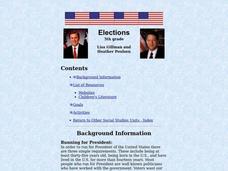Curated OER
Creating a Government
A simulation gives scholars a personal look at what goes into forming a government. Each of them is assigned 1 of 4 tribes which make up Borka, a hypothetical country. The tribe distribution is based on the percentage of people in each....
National Endowment for the Humanities
James Madison: Raising an Army—Balancing the States and the Federal Government
To war! To war! Every nation in the history of the world has had to deal with warfare on some level. Scholars go through a series of activities and discussions surrounding the development of the Constitution to help them better...
Curated OER
Who's The Boss?
Upper elementary and middle schoolers research and analyze some different types of governments. Democracies, Monarchies, and Dictatorships are some of the types that are looked at. Learners use the Internet to gather information that...
Curated OER
Comparing Utah's Past and Present Government
Fourth graders research the past and present forms of government in Utah. In this government studies activity students analyzes different forms of government and work with a group to gather information about how Utah was/is run and then...
Curated OER
The Three Branches of Government
Middle schoolers complete a unit on the three branches of government. They compare/contrast the three branches of government, write a letter or e-mail to an executive in the Federal Government, and develop outlines for historical...
iCivics
Step Five: All about Public Policy
Public policy is important to understand because it affects everyone. The resource tells middle schoolers how the government uses policy to accomplish goals in the administration. It includes a reading, true or false worksheet, a...
Curated OER
Bill Of Rights
Young scholars examine Supreme Court cases. In this U.S. government lesson, students watch a video about the Bill of Rights and then research 4 Supreme Court cases using the noted web site. Young scholars analyze the presented...
National Endowment for the Humanities
Lesson 2 James Madison: The Second National Bank—Powers Not Specified in the Constitution
How much power is too much power for the federal government? Scholars use primary documents and constitutional research in groups to analyze the creation of the Second National Bank under James Madison. This is the second lesson of a...
Constitutional Rights Foundation
Guest-Worker Program
The U.S. Guest-Worker Program and the H-2A visa are the focus of a social studies activity. First, class members assume the role of advisors who must present the president with four proposals that would amend the visas given to...
Curated OER
Registering to Vote
Eighth graders register to vote. For this registration lesson, 8th graders complete the first step of the voting process by completing a form. Students use this lesson to prepare for a mock election. The lesson is part of a unit.
Curated OER
The Bill of Rights
In groups, learners review one of four selected Supreme Court cases. The whole class watches a video introducing the four cases, and then small groups dive into Internet research in an attempt to write a two-paragraph summary of the...
Curated OER
Separation of Powers: Connecting the Separate Powers
Students study the concept of separation of powers. They recognize how the Constitution provides for separation of powers and categorize public officials into one of three branches of government. Students do a role play and see if...
PBS
Universal Declaration of Human Rights
What rights are guaranteed to students? Do they align with the Universal Declaration of Human Rights, which was approved by the United Nations in 1948? Middle and high schoolers present persuasive arguments about the rights they believe...
Curated OER
Elections
Fifth graders examine the voting process, the electoral college and the voting process. They identify qualities important to a president. They fill out ballot sheets and study the registration forms.
Curated OER
American Heritage Themes
Pupils define freedom, unity, progress, and responsibility in relation to American Heritage. They explore the origin of how American Heritage was developed and ways in which they can continue it today. They also determine ways they can...
Curated OER
A Lesson To Accompany "The First Bank of the United States: A Chapter in the History of Central Banking"
Here is an interesting topic. Learners examine the economics that led to the founding of the First Bank of America. They participate in a reader's theater experience depicting the debate between Alexander Hamilton and Thomas Jefferson...
Museum of the Moving Image
Evaluating Information: Focus on the 2008 Election
Just how true is the information contained in political ads? Determining the veracity of campaign ads from the 2008 presidential race is the focus of a lesson that introduces class members to several fact-checking resources.
Deliberating in a Democracy
Crime and Punishment
Should the United States ban the death penalty? Scholars use real-life examples of criminal activity to come to their own conclusions on the death penalty. Primary source documents, as well as video clips, open the issue of capital...



















